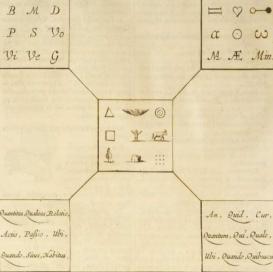Reflections on signs and procedures of signifying had a profound impact on a wide range of early scientific practices across the globe, from medical astrology to mathematizing natural knowledge and from retrieving the signatura rerum in alchemy to mapping the New World. Such theories also addressed the relationships between signification and scientific experience, and thereby laid the foundations for subsequent scientific developments.
This working group explores premodern writings on the articulation, codification, and communication of experiences of the natural world through verbal, visual, and other semiotic means. Its outcome will be an edited collection provisionally titled Signs and Signification in a Global Comparative Perspective: A Reader, edited by Glenn Most and Maria Avxentevskaya. The volume will present excerpts from primary sources from across the world, ranging from ancient traditions to early modernity. Featuring introductions, translations, commentaries, and bibliography, it will cover such themes as the modes of signifying in philosophy and theology; semiosis and semantics in logic and the order of sciences; intentionality; prognostication; codification; and mediation between classical and vernacular cultures of knowledge. The historical contexts include ancient Greek philosophy (Glenn Most), classical Islamic theology (Hannah Erlwein), medieval European natural philosophy (Dominic Dold), premodern Hebrew thought (Yehuda Halper), the Sanskrit tradition (Eric Gurevitch), divination and prognostication in China (Michael Lackner), and early modern artificial languages (Maria Avxentevskaya).

